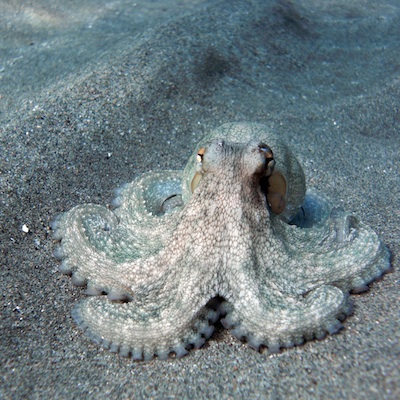Subscription Center




Florida stone crabs (Menippe mercenaria) are known to diners for their sweet, meaty claws. And octopuses also seem to relish these delicacies. Reports are coming out of Florida that the stone crab fishery is way down this year—and many think local common octopuses (Octopus vulgaris) are to blame. The crabs are caught in traps, most [...]
Keep reading »
The diminutive blue-ringed octopus (Hapalochlaena lunulata) looks like a sweet, possibly even fantastical creature. Often measuring less than 20 centimeters long and covered with dozens of bright blue rings, it spends most of its time hiding out in shells or rocks near the beach. But don’t be fooled—this little cephalopod is trouble. One small nip [...]
Keep reading »
Octopuses and Kindles might have more in common than you think. It’s true that you can’t read a Jules Verne novel off an octopus. And a Kindle can’t camouflage itself against a brightly colored, textured coral reef. But the two both depend on using ambient light to generate their “display,” and both can change their appearance [...]
Keep reading »Octopuses are clever, reclusive, dexterous, strong and slippery as heck—especially those belonging to the very largest species: the giant Pacific octopus (Enteroctopus dofleini). So how are researchers to catch and track them? Certainly not with traditional nets and tags, which the octopuses can (respectively) squeeze out of and rip off. Instead, try enlisting the help [...]
Keep reading »
August 21st, 2012 |
![]() 22
22

Elephants cooperate to solve problems. Chimpanzees teach youngsters to make tools. Even octopuses seem to be able to plan. So should we humans really be surprised that “consciousness” probably does not only exist in us? This privileged state of subjective awareness in fact goes well beyond Homo sapiens, according to the new Cambridge Declaration on [...]
Keep reading »
August 16th, 2012 |
![]() 1
1

An octopus can slink through amazingly small spaces—often much to the chagrin of aquarium owners and zookeepers. These animals’ muscular, boneless bodies have just one hard part—a small beak. So the rest of their flexible forms can maneuver into crevasses, along tiny tubes and even through small holes in a finely woven fisherman’s net. By [...]
Keep reading »
June 1st, 2012 |
![]() 2
2

The octopus is an amazing master of disguise. It can essentially vanish, right before your eyes, into a complex scene of colorful coral or a clump of kelp waving in the currents. For a view of this phenomenon in reverse, check out this now-viral video shot by Woods Hole Marine Biology Laboratory senior scientist Roger [...]
Keep reading »
May 14th, 2012 |
![]() 4
4

Octopuses have made themselves at home in most of the world’s oceans—from the warmest of tropical seas to the deep, dark reaches around hydrothermal vents. Antarctic species, such as Turquet’s octopuses (Pareledone turqueti), even live slow, quiet lives near the South Pole. But these retiring creatures offer a rare opportunity to help understand how this [...]
Keep reading »
April 5th, 2012 |
![]() 2
2

Octopuses possess camouflage abilities that put some of our military’s best high-tech efforts to shame. And their flexible, intelligent arms are the envy of roboticists and artificial intelligence engineers worldwide. But these animals, which have evolved over hundreds of millions of years, can teach us even more about security in the 21st century than camo [...]
Keep reading »
February 20th, 2012 |
![]() 3
3

Octopuses are purportedly colorblind, but they can discern one thing that we can’t: polarized light. This extra visual realm might give them a leg (er, arm) up on some of the competition. And a team of researchers has created a new way to test just how sensitive cephalopods are to this type of light. Their [...]
Keep reading »